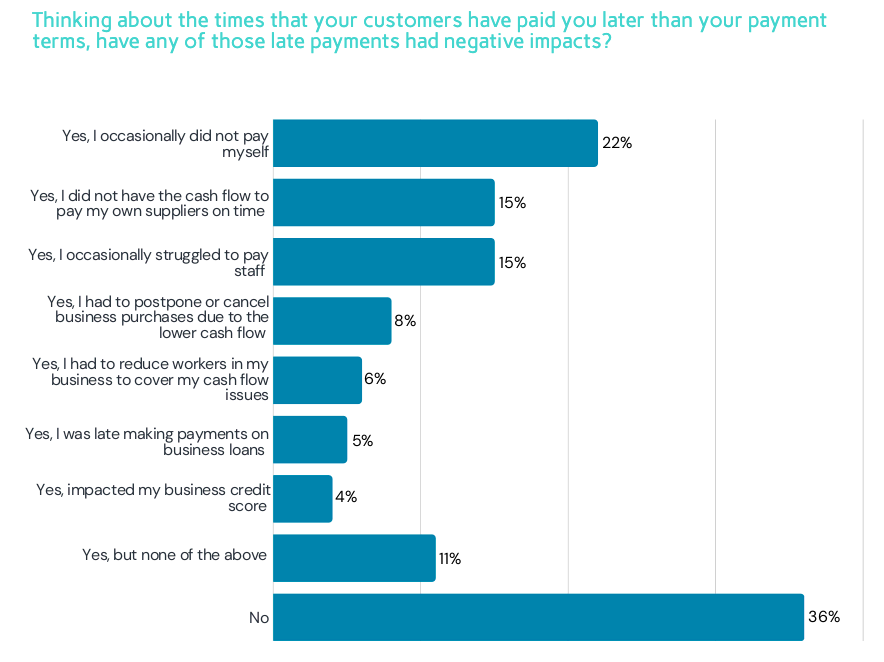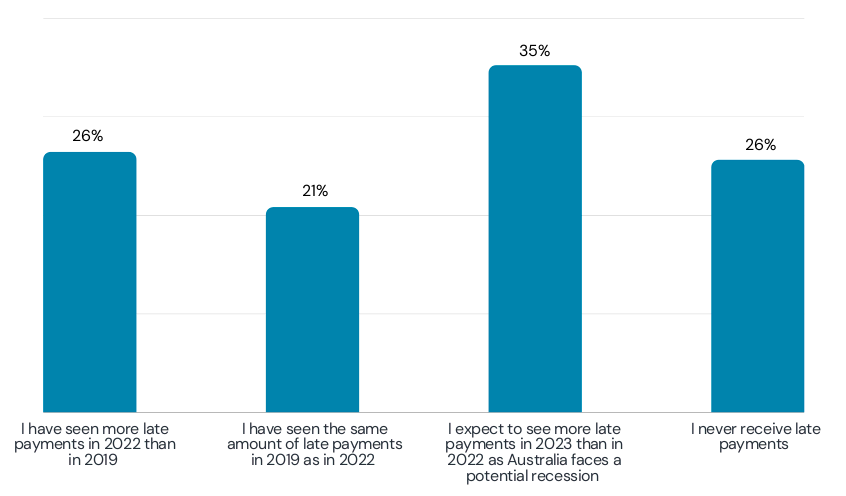Here's how businesses are impacted by customers paying late

Two-thirds of Australian SMEs (64%) have been negatively impacted by late payments, with 22% of business owners struggling to pay themselves and 15% struggling to pay staff when customers fail to pay on time, the latest survey from Small Business Loans Australia has revealed.
Respondents surveyed included 210 owners and senior decision-makers across the full SME spectrum: micro (1-10 employees), small (11-50 employees) and medium-sized (51-200 employees), as well as a small percentage of larger businesses (more than 200 employees).
SMEs were reportedly negatively impacted by late customer payments when it comes to business owners’ salary, cash flow to pay supplier invoices, staff salaries, ability to pay business purchases, size of workforce, payments on business loans, and business credit score.

Of the 64% of respondents who were negatively impacted by late payments, 22% occasionally did not pay themselves, an equal 15% didn’t have enough cash flow to pay their own suppliers on time or occasionally struggled to pay staff, 8% had to postpone or cancel business purchases due to lower cash flow, 6% had to reduce workers in their business, 5% were making late payments on a business loan, 4% had their business credit score negatively impacted, and 11% were impacted negatively in another unspecified way.
Small businesses were the most negatively impacted by late payments, with 86% specifying at least one negative impact, followed by 78% of medium-sized businesses, and 54% of micro businesses.
Concerningly, 30% of medium-sized businesses said they occasionally struggled to pay their staff due to customers paying late, closely followed by 27% of small businesses and 8% of micro businesses.
Findings also revealed that NSW has the highest proportion of businesses that have experienced the negative effects of late payments, impacting 73% of SMEs in the state. This is followed by 64% of West Australian, 62% of Victorian, 56% of Queensland, and 53% of South Australian SMEs.
Business owners in NSW were also most likely to occasionally sacrifice their own salaries when customers paid late, chosen by 25% of NSW respondents. This was followed closely by 24% of West Australian, 23% of Queensland, 22% of Victorian, and 16% of South Australian respondents.
When asked whether they are experiencing a higher rate of late payments now than in 2019, 26% of businesses said they received more late payments in 2022 than in 2019, while 21% said they had seen no change in the number of late payments since 2019. Over a third (35%), meanwhile, were expecting to see a rise of late payments this year compared with 2022 due to the rising threat of recession.

Across the states, NSW businesses were again most likely to have experienced a rise in late payments from 2019 to 2022, chosen by 35% of respondents. This was followed by 32% of West Australians, 26% of South Australians, 22% of Victorians, and 21% of Queenslanders.
Victorian business owners were most pessimistic about late payments in 2023, with 39% expecting to see a rise in late payments this year, followed by 37% of South Australians, 36% of NSW business owners, 32% of West Australians, and 29% of Queenslanders, the study found.
“With so many economic risks on the horizon, it is a concerning time for small business owners – who need to forecast their cash flow for the 2024 financial year,” said Alon Rajic (pictured above), founder and managing director of Small Business Loans Australia.
“Late customer payments can cause frustrations and great impact on a business. Businesses that are struggling with a cash flow problem due to late payments may take out a business loan to assist. If so, SMEs should ensure they are getting the best deal on their loan including low interest and other low fees such as early-payout and sign-up fees.”
Click here to access the full survey results, including breakdowns across business sizes and states.
Have a thought about this story? Include it in the comments below.



